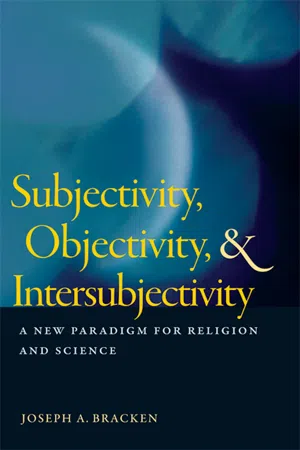
Subjectivity, Objectivity, and Intersubjectivity
A New Paradigm for Religion and Science
- English
- ePUB (mobile friendly)
- Available on iOS & Android
Subjectivity, Objectivity, and Intersubjectivity
A New Paradigm for Religion and Science
About This Book
During the Middle Ages, philosophers and theologians argued over the extramental reality of universal forms or essences. In the early modern period, the relation between subjectivity and objectivity, the individual self and knowledge of the outside world, was a rich subject of debate. Today, there is considerable argument about the relation between spontaneity and determinism within the evolutionary process, whether a principle of spontaneous self-organization as well as natural selection is at work in the aggregation of molecules into cells and the development of primitive forms of life into complex organisms. In Subjectivity, Objectivity and Intersubjectivity, Joseph A. Bracken proposes that what is ultimately at stake here is the age-old problem of the relationship between the One and the Many, universality and particularity on different levels of existence and activity within nature.
Bracken rejects traditional models of this relationship, wherein either the One or the Many is presupposed to have priority over the other. He instead suggests that a new social ontology—one that is grounded in a theory of universal intersubjectivity—protects both the concrete particularity of individual entities in their specific relations to one another and their enduring corporate reality as a stable community or environment within Nature.
What emerges is a bold reimagining of the sometimes strained relationship between religion and science. Bracken's clear writing, sophisticated philosophical analysis, and exemplary scholarship will lend this new work an enthusiastic appreciation by readers with deep interests in philosophy and philosophical theology.
Frequently asked questions
Information
Table of contents
- Half Title Page
- Title Page
- Copyright
- Dedication
- Contents
- Foreword
- Acknowledgments
- Introduction
- Chapter 1 - The Individual in A World of Universals
- Chapter 2 - The Turn to the Subject
- Chapter 3 - What is Matter and what is Spirit?
- Chapter 4 - Kant’s Copernican Revolution
- Chapter 5 - Transcendental Idealism and the Empirical Other
- Chapter 6 - The Revolt Against Systems Thinking
- Chapter 7 - Starting with Events Rather than Things
- Chapter 8 - The One, the Three, and the Many
- Chapter 9 - Open-Ended Systems
- Chapter 10 - Parts and Wholes in Contemporary Natural Science
- Chapter 11 - Time and Eternity in Religion and Science
- Chapter 12 - Conclusions
- Notes